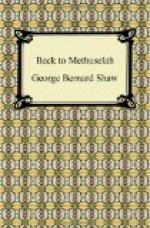to the conclusion. Goethe said that all the shapes
of creation were cousins; that there must be some
common stock from which all the species had sprung;
that it was the environment of air that had produced
the eagle, of water the seal, and of earth the mole.
He could not say how this happened; but he divined
that it did happen. Erasmus Darwin, the grandfather
of Charles, carried the environment theory much further,
pointing out instance after instance of modifications
made in species apparently to adapt it to circumstances
and environment: for instance, that the brilliant
colors of the leopard, which make it so conspicuous
in Regent’s Park, conceal it in a tropical jungle.
Finally he wrote, as his declaration of faith, ’The
world has been evolved, not created: it has arisen
little by little from a small beginning, and has increased
through the activity of the elemental forces embodied
in itself, and so has rather grown than come into
being at an almighty word. What a sublime idea
of the infinite might of the great Architect, the
Cause of all causes, the Father of all fathers, the
Ens Entium! For if we would compare the Infinite,
it would surely require a greater Infinite to cause
the causes of effects than to produce the effects
themselves.’ In this, published in the year
1794, you have nineteenth-century Evolution precisely
defined. And Erasmus Darwin was by no means its
only apostle. It was in the air then. A
German biologist named Treviranus, whose book was published
in 1802, wrote, ’In every living being there
exists a capacity for endless diversity of form.
Each possesses the power of adapting its organization
to the variations of the external world; and it is
this power, called into activity by cosmic changes,
which has enabled the simple zoophytes of the primitive
world to climb to higher and higher stages of organization,
and has brought endless variety into nature.’
There you have your evolution of Man from the amoeba
all complete whilst Nelson was still alive on the
seas. And in 1809, before the battle of Waterloo,
a French soldier named Lamarck, who had beaten his
musket into a microscope and turned zoologist, declared
that species were an illusion produced by the shortness
of our individual lives, and that they were constantly
changing and melting into one another and into new
forms as surely as the hand of a clock is continually
moving, though it moves so slowly that it looks stationary
to us. We have since come to think that its industry
is less continuous: that the clock stops for a
long time, and then is suddenly ‘put on’
by a mysterious finger. But never mind that just
at present.




